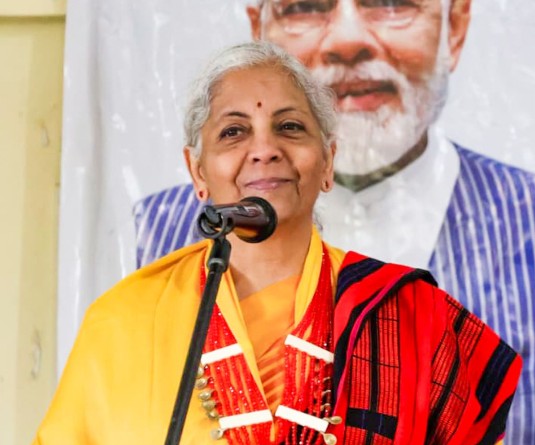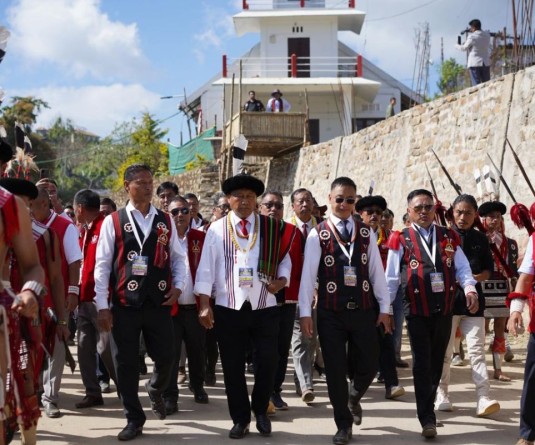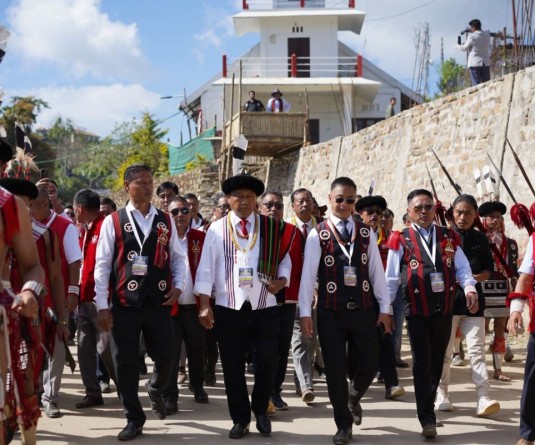NLTP Act: To be, or not to be
.jpg)
Attendants during the conversation on the NLTP Act held at DB-IDL Hall, Dimapur on March 14. (Morung Photo by Soreishim Mahong)
Stay, repeal or democratize the debate for review?
Morung Express News
Dimapur | March 14
Debate over the contentious liquor prohibition law in Nagaland has for the most part pivoted around revoking or letting it remain. Successive governments over the years have tried only to meet premature deaths in the face of opposition from the church.
But there is still room to arrive at a conclusion albeit through constructive dialogue.
Basing on this premise, on March 14, Heritage Publishing House, Morung Foundation and The Morung Express collaboratively presented ‘The Conversation on: Should the NLTP Act continue in Nagaland?’ styled on the lines of an interactive panel discussion at the DB-IDL, Dimapur.
The personalities in the panel were K Ela, Director of Prodigals’ Home; Kevisetuo Angami, Additional Commissioner of Excise; Dr Pangernungba Kichu, Professor of Society, Christian Ethics and Contemporary Theology at Oriental Theological Seminary; Dr Salikyu Sangtam, Assistant Professor, Faculty of International Relations and Political Science, North East Christian University; and noted social commentator Kahuto Chishi Sumi, who is also the Akukau (headman) of Hevishe village.
As opposed to the conventional two-way ‘for and against’ debate, the discussion today also brought up ideas that sought to provide means for the two diverging opinions to arrive at a middle point.
In the words of Prodigals’ Home Director Ela, “There should be very honest and heart to heart discussions on this. We tend to blame the government and the church but we are also part of it.”
While emphasising the need for a collective and candid dissection of the issue, she said that continuing with the blame game would only result in more lives being lost and more families breaking apart. According to her, the debates have so far been isolated, limited to certain agencies and organizations. “If we are to continue with the Act, we have to revisit the Act and look at it from the aspect of making a law that which really makes individuals more responsible.”
Echoing Ela’s view, Dr Kichu said that the debate must be brought to the public domain and the NLTP treated in the context of a “public property.” “It cannot be spoken of in isolation,” he said.
He observed that the debate has been limited to hurling criticisms and that “oppositional discourse” will not work. While calling for a respectful approach, he said, “We have to create an environment for discussion. There has to be a process. If the church is not coming out, the citizens must democratize the process.”
On the part of the church, he said that as the driving force behind the Act, it should also be sensitive to the opposing views and the ground reality and forthcoming enough to initiate dialogue.
For Dr Sangtam, the debate should not be limited to the question of “for or against” alone but rather a self-questioning, introspective one. “We are missing the point. We must rather be asking what makes the people consume alcohol. Alcohol does not make a society good or bad, it is the individuals,” he said.
He broached a consequential scenario, as in, the effects it would have on the people in the event the Act is repealed. “If it is lifted we may get some revenue. But is a little revenue more valuable than human lives?”
As an enforcement officer, Kevisetuo Angami highlighted the challenges faced by the Excise department against liquor proliferation in Nagaland. Nevertheless, he maintained that the department is doing whatever it can with the means at its disposal. He though admitted that the state is losing revenue.
If the state is to continue with the Act, he said that identifying the people running the illicit liquor trade is crucial. He added that there is also the issue of rehabilitation, especially marginalized women resorting to selling liquor to make ends meet. “We have to be sensitive and also look at the aspect of rehabilitating such people.”
Kahuto Chishi Sumi was rather point blank in his views challenging the moral posture of the church as far as alcohol is concerned. According to him, consuming alcohol is a matter of choice and the Act of law that the church lobbied for, has denied the right of choice to the individual.
Pointing to the open sale of liquor, he said that Prohibition has only exacerbated a problem it sought to cure. He questioned as to why the church is reluctant to admit howsoever well intentioned it may have been originally.
“It is not a question of whether we can improve the Act. It has to be abrogated,” he said.
Further, members in the audience referred to statistics pointing to an increase in the demand for certain pharmaceutical drugs (for recreational purpose) as a result of the NLTP Act.
Aküm Longchari, Publisher, The Morung Express, in his concluding remarks called for “democratizing the (NLTP) discourse.” “So far, it has been centered around certain institutions. However, it needs to go to the people because they are the primary stakeholders.”






